Reagan
 for violent content and smoking.
for violent content and smoking.
Reviewed by: Keith Rowe
CONTRIBUTOR
| Moral Rating: | Good |
| Moviemaking Quality: |
|
| Primary Audience: | Adults Young-Adults Teens |
| Genre: | Biography Drama History |
| Length: | 2 hr. 15 min. |
| Year of Release: | 2024 |
| USA Release: |
August 30, 2024 (wide release) DVD: November 19, 2024 |
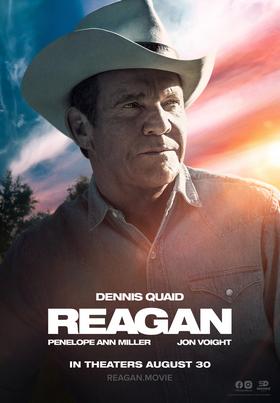

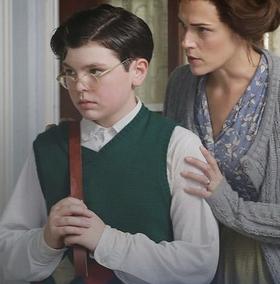
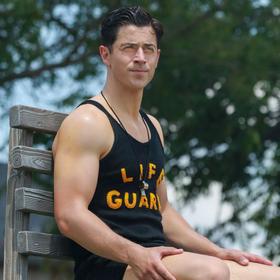
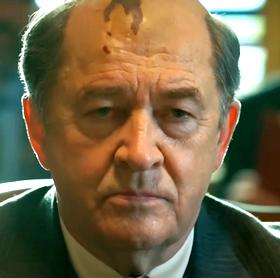
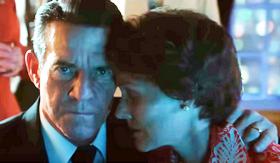
The enduring impact of the power of one man
Life of Ronald Reagan, from his childhood to his time in the oval office
Overcoming the odds
Continuing threat of belief in Marxism and Communism

Review: “In the Face of Evil: Reagan's War in Word and Deed” (2004)

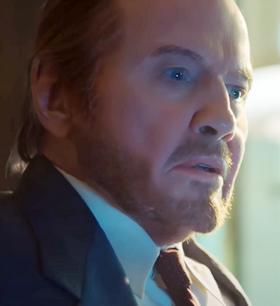
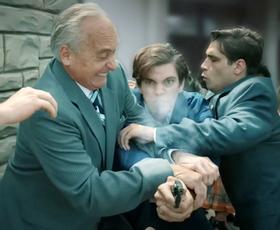
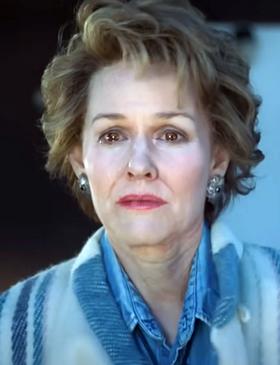
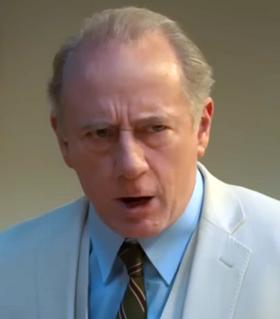
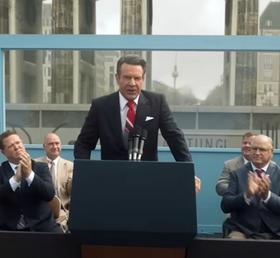
| Featuring |
|---|
|
Dennis Quaid … Ronald Reagan Penelope Ann Miller … Nancy Reagan Jon Voight … Viktor Petrovich, former KGB officer Xander Berkeley … George Schultz, Secretary of State C. Thomas Howell … Caspar Weinberger, Secretary of Defense Robert Davi … Leonid Brezhnev, General Secretary of the Communist Party of the Soviet Union Mena Suvari … Jane Wyman, American actress and first wife of Ronald Reagan Amanda Righetti … Nelle Reagan, mother of Ronald Reagan Justin Chatwin … Jack Reagan, father of Ronald Reagan Jennifer O'Neill … Older Nelle Reagan, mother of Ronald Reagan Lesley-Anne Down … Margaret Thatcher, Prime Minister of the United Kingdom Elya Baskin … B.E. Kertchman, a Soviet citizen who defected to the U.S. Kevin Dillon … Jack Warner, head of Warner Bros. studio David Henrie … Young Reagan Dan Lauria … Tip’ O’Neill, Democrat politician and Speaker of the House of Representatives Will Wallace … Attorney General Edwin Reese Olek Krupa … Mikhail Gorbachev, last General Secretary of the Communist Party of the Soviet Union Pat Boone … Himself / Reverend George Otis Paul T. Taylor … Dr. Benjamin Aaron, surgeon at George Washington University Hospital Mark Moses … William P. Clark, National Security Advisor, Secretary of the Interior See all » |
| Director |
|
Sean McNamara |
| Producer |
|
MJM Entertainment Rawhide Pictures See all » |
| Distributor |
March 30, 1981 – Washington, D.C.
Ronald Reagan (Dennis Quaid) wraps up his speech at an AFL-CIO meeting with an amusing anecdote about baseball and diapers. Though the sky is gray, the mood is light as Reagan shares a joke with several staffers on the way to the motorcade. He approaches the open door of the presidential limo. Shots ring out. Secret service agents rush to protect the president. President Reagan has been shot!
Present Day – Moscow
A young man visits the home of former KGB officer, Viktor Petrovich (Jon Voight). 30 years ago, Petrovich studied everything about Reagan, from his younger years as a football player, lifeguard and radio reporter to his career as a movie star and eventual rise to the highest office in America. Petrovich educates the young man about the major historical events during the Cold War, many of which he witnessed firsthand, and how the “Crusader” (Reagan) brought about the downfall of the Soviet Union.
Which wouldn’t have happened if the assassin’s bullet had proved fatal to the newly-elected president. Coincidence or providence?
Before I dive into such provocative questions in my analysis of the new biopic, “Reagan,” I need to issue a disclaimer: while I always try to be fair and balanced in my reviews, my objectivity may be compromised in this instance since I esteem Reagan as the finest president of my lifetime.
That said, the story, written by Howard Klausner, is reverent in its portrayal of the 40th President of the United States, but feels rushed at times… perhaps because Reagan accomplished so much during his extraordinary life. However, while focusing on Reagan’s more heroic qualities, Klausner breezes past such negative events as the Iran-Contra scandal and disingenuously suggests that Reagan’s bout with Alzheimer’s disease didn’t become pronounced until after he was out of office (in reality, Reagan’s Alzheimer’s became progressively worse during the latter stages of his presidency).
Though Klausner checks all the boxes of the major events and achievements in Reagan’s life, he only gives us a few glimpses of the real man. Yes, there are exceptions, like when Reagan shares his self-doubts with wife Nancy (Penelope Ann Miller) or when he takes time out of his busy schedule to compose handwritten notes to world leaders as well as young boys. But these scenes only give us a quick peek behind the curtain at the real person, while the balance of the picture is enamored of the historical figure. In short, Klausner’s inability to humanize a very human man comes off as a major shank.
Unfortunately, the movie’s directing is also a miss. Sean McNamara (“The Miracle Season”) is adequate to the task, but the story of such a beloved American president deserved more than just adequate treatment. With its lengthy establishing shots of city skylines and punchy score that tries too hard to infuse slower scenes with energy, the movie often feels like a glorified TV mini-series. Still, the movie is an admirable effort since it didn’t have the financial backing of a major Hollywood studio.
If the film has a strong suit, it’s the cast. Quaid is the movie. If his portrayal had fallen flat, the movie would’ve too. Though he isn’t a dead ringer for the president, Quaid’s speech and mannerisms approximate Reagan’s without drifting into caricature. Also, Quaid pulls off Reagan’s twinkle in the eye charm with comparative ease.
The transformation of Quaid to look like Reagan over the decades is remarkable, so kudos to the makeup department for pulling off one of the most realistic aging processes I’ve ever seen in a film (of course, it helps that Quaid is in amazing shape for his age).
It’s ironic that Quaid’s star was rising in Hollywood during the same years Reagan was president. Now, Quaid is playing the famed president at age 70 (Reagan was 69 when he took office).
In another casting coup, Voight is absolutely superb as Petrovich. His Russian accent is credible and his performance is skillfully understated. Instead of being bitter and angry over losing to Reagan, Petrovich has developed respect, perhaps even admiration, for the American president. Why else would Petrovich devote so much of his life to studying Reagan’s exploits? Profiling Reagan, from his early years to his golden years, is more than a job… it’s an obsession. All of this is conveyed through Voight’s masterful performance without a single line of dialog to explain Petrovich’s psychology.
Though many of the supporting actors don’t have prominent parts, they make the most of their allotted screen time. The eclectic collection of journeyman performers include: Mena Suvari, C. Thomas Howell, Amanda Righetti, Kevin Dillon, Xander Berkeley, Lesley-Anne Down, Robert Davi, Mark Moses and many others. In a pair of blink-and-you’ll-miss-'em cameos, Kevin Sorbo plays Reverend Ben Cleaver, Reagan’s childhood pastor, and Pat Boone plays Reverend George Otis, the man who predicted (or prophesied?) that Reagan would become president.
Spoiler warning: Some may find it odd that the story of one the most highly regarded American presidents is told by a Russian. This narrative device is certainly compelling from an artistic perspective, but how will audiences (largely conservative, one would assume) react to this more liberal story choice? Perhaps I’m making a mountain out of a molehill, but time will tell.
Spiritual Aspects
For starters, it’s so refreshing to see faith foregrounded, and positively portrayed, in a modern movie. In addition to glimpses of corporate worship and Scripture reading, several people are baptized in a local river in one scene. Characters from the Bible are mentioned throughout the story, such as David and Goliath, Moses and Christ. During Reagan’s swearing in ceremony, we see pages of his Bible with notes written in the margins.
From the early stages of the film, we’re shown how church attendance and participation was a significant part of Reagan’s life. Even as a young boy, Reagan recited Bible passages, like 2 Chronicles 7:14, from memory (a skill that would later help him learn lines as an actor and learn speeches as the president) in front of the congregation of the First Christian Church of Dixon, IL. It’s also encouraging that young Reagan sought advice from Reverend Cleaver, who, by many accounts, became like a second father to the boy.
It’s plain to see how such a strong moral upbringing paid dividends in Reagan’s adult life, especially when he was faced with ethical and existential challenges as commander-in-chief. While his record reflects many successes, it wasn’t spotless. The Iran-Contra affair remains a black mark on his presidency. As if exploiting a loophole to sell arms to Iran in order to fund the Contras in Nicaragua wasn’t bad enough, Reagan lied (Proverbs 12:22) about it when questioned by the press. Later, when the word “impeachment” was being tossed around by many politicians on Capitol Hill, Reagan apologized for lying to the American people in a national address on TV. Though he eventually made the right decision, Reagan shouldn’t have allowed things to escalate before coming clean to the public. The Bible calls withholding the truth a “sin of omission” (James 4:17).
The result of this admission of failure was that, by and large, the American people forgave Reagan his transgression. When recounting the event, Petrovich tells his young protégé, with a hint of amusement, that the American people “forgive you every time.” While humans can give each other absolution for wrongful actions taken, it’s only God’s forgiveness—paid for by the blood of Jesus, who died for ours sins on a Roman cross—that can truly release us from the terminal condition of sin (Romans 6:23).
Even before getting into politics, Reagan’s life was marked by hardship. Aside from growing up with an alcoholic father, life dealt Reagan a haymaker when a child he conceived with his first wife, actress Jane Wyman (Suvari), died on the day she was born. Soon after that tragic event, the couple was divorced, a marital outcome that God hates (Malachi 2:16).
After the divorce, a dispirited Reagan tells his mother (Jennifer O'Neill) he “missed the boat on that whole purpose thing.” This exposes the danger of tying our purpose in life to a spouse, career or anything else but God. Reagan’s mother admonishes him to “remember who you are and who you serve.” These loving and wise words help Reagan reevaluate his life and career.
Q & A
What is biblical wisdom?
A short time later, Reagan meets his second wife, Nancy (Miller). When Reagan tells Nancy he’s divorced, she graciously replies, “We’re all damaged goods,” which expresses a similar sentiment to what’s written in Romans 3:23, “For all have sinned and fall short of the glory of God.” Feeling the weight of his purpose, Reagan tells Nancy, “I just want to do something good in this world…make a difference.” Nancy’s reply is her commitment to stand by his side: “[That’s] hard to do alone.”
Another devastating blow came in 1976, when Reagan lost the Republican party nomination to Gerald Ford. Reagan accepted the loss as part of God’s will. It also was about God’s timing. Whereas the nation could’ve benefited from Reagan’s leadership in the late 70’s, it was desperate for his guidance and moral clarity in the 80s. In retrospect, Reagan was the right leader during one of the most dangerous periods in our nation’s history. But, if it was left up to Reagan, he would’ve become president too soon. This is an important lesson; learning to accept God’s timing in our lives can be difficult, especially in an era of instant gratification and personal advancement at all costs.
Of course, the most prominent spiritual theme in the movie involves the assassination attempt by mentally ill gunman, John Hinckley Jr. This brings us back to the question posed above: was Reagan’s life spared by God or was it just fate? From the proximity of the bullet to Reagan’s vital organs, there can be no doubt that it was a miracle he survived the shooting (especially at his age). During his convalescence, Reagan said everything happens for a reason and that the shooting was “part of the divine plan” (Jeremiah 29:11) for his life. It could be said that Reagan’s brush with death served to solidify his purpose and fuel his tireless fight for freedom during his presidency. And that the hand of providence was on Reagan, and the nation, during his time in office.
Objectionable Material
OFFENSIVE LANGUAGE/VULGARITIES: There are only a handful of swear words in the movie, including: h*ll (4), d*mn (2) and *ss (1).
ALCOHOL/DRUGS: Numerous scenes show individuals drinking alcohol and smoking cigarettes, particularly those set inside restaurants or the offices of world leaders. Specific drinks are mentioned, such as whiskey and vodka. Two glasses containing red wine are visible in one scene. Reagan does a pitch for Pabst Blue Ribbon beer onstage and drinks from a bottle outside the club. Reagan tells rival politician Tip O’Neill (Dan Lauria) that at the end of the day they’ll just be “two Irishman having a beer.” Reagan’s father is shown drinking in a few scenes.
NUDITY AND SEXUAL CONTENT: There’s no nudity in the movie. A couple is shown kissing in a few scenes. Line dancers in short skirts take the stage in one brief scene. A man is shown with a pair of underwear on his head.
VIOLENCE AND GRAPHIC CONTENT: Though the assassination attempt is intense, it isn’t overly graphic. Reagan’s clothes have some blood on them. In the hospital we see the bullet hole on Reagan’s bare abdomen, but there’s very little blood. Several scenes focus on riots; punches are thrown in one scene and a car is overturned in another. A fist fight between two boys is heard offscreen.
Final Thoughts
In the end, this movie is about a man who loved God, his country, his wife and his horses. It isn’t overly complicated, but then again, neither was President Reagan. Compared to today’s Machiavellian and morally murky politicians, Reagan was a straight shooter. Perhaps that’s why he’s so well-loved.
“Reagan” is a very timely movie, not only because of the upcoming election, but also because of the recent failed assassination attempt on President Trump. The two presidents share more than this unfortunate distinction. Many of Trump’s policies were taken directly from Reagan’s playbook. Both presidents focused on freedom, faith and family rather than petty politics, personal power grabs and polarizing propaganda, as did many of their political adversaries. Also, they believed in a stronger, freer, more prosperous and more moral (though certainly not perfect) America. That’s MAGA in a nutshell! And that’s just as much (if not more so) Reagan’s lasting legacy as it is Trump’s.
The contrast between the current administration and Reagan’s two terms in office couldn’t be more obvious, especially when you walk out of this movie, which is something I experienced firsthand. As “Reagan” ended, two women, who had been watching the last few minutes of the movie from the side entrance, came in to clean the theater. They were enthusiastic and inspired by what they’d seen. One woman with an Eastern European accent said, “Now that’s a president!” I agreed wholeheartedly.
As opposed to the “odor of mendacity” that permeates the current administration, the optimism inherent in Reagan’s administration was a refreshing breath of liberty, but also a sobering reminder that, as he once stated, “Freedom is never more than one generation away from extinction.”
Tip: Be sure to stay through the end credits—if the actual footage of Reagan’s funeral and archival photos of various moments of his life aren’t enough to move you, the closing letter is sure to leave you misty-eyed.
- Drugs/Alcohol: Moderate
- Violence: Mild
- Vulgar/Crude language: Mild
- Profane language: None
- Nudity: None
- Sex: None
- Occult: None
- Wokeism: None
See list of Relevant Issues—questions-and-answers.


Accurate historical depictions, good storytelling, good script, cinematography. Interesting blending of real news reports and footage. Touched on major events and kept moving. I liked how the story is framed by observations from a Soviet agent who studied Reagan. Very pleasant surprise that the film included prayers, Scripture passages and scenes reflecting Reagan’s Christian faith. Overall, very positive.
Moral rating: Good / Moviemaking quality: 5
It’s a masterpiece that history teachers will be assigning to their classes for years to come. Worth every penny! It’s a historical work, so it includes smoking, alcohol, fist fighting, and talks of war, but there is NOTHING added to it to unnecessarily make it bad. It’s just a portrayal of everyday life. If it weren’t for that, I would have given it an excellent moral rating. As it is, it’s better than average.
Moral rating: Better than Average / Moviemaking quality: 5
Still, this is an intelligent and compelling film, and younger people as well might enjoy seeing his inspiring story put to the screen. Please ignore those scathing media reviews that were obviously written by anti-Reagan types before they even saw the movie.
Moral rating: Good / Moviemaking quality: 4½
PLEASE share your observations and insights to be posted here.
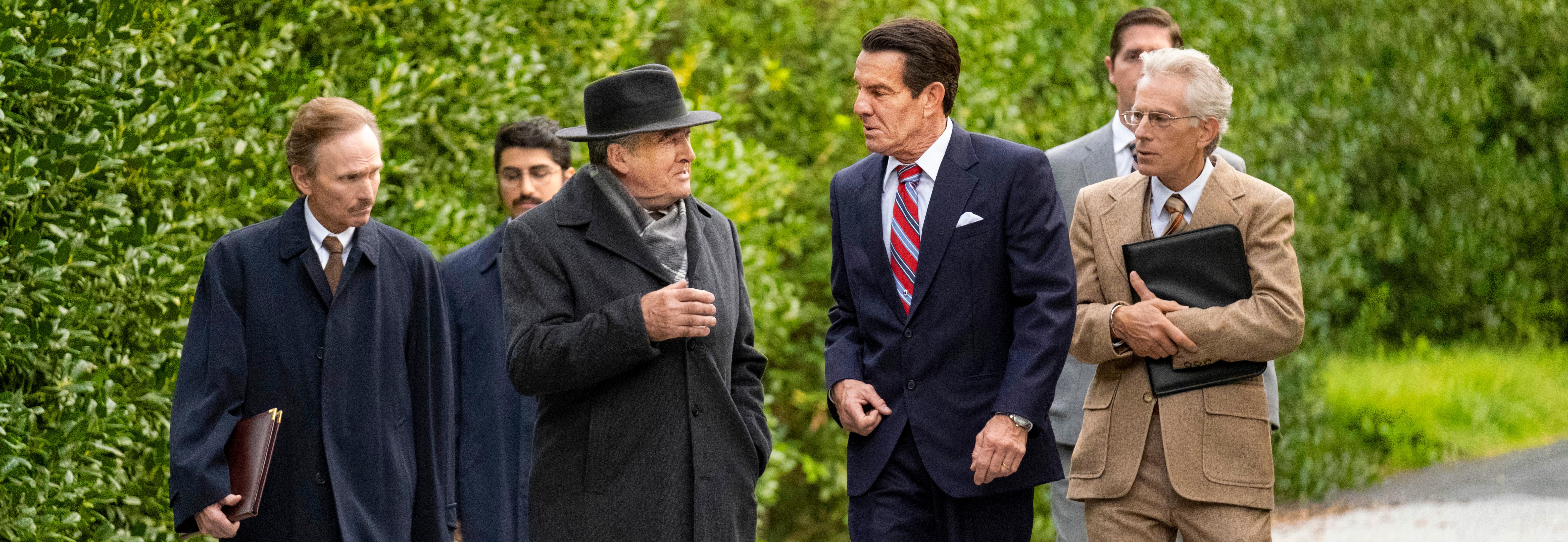

Ronald Reagan changed the world to make a difference for the Lord later in life. This inspired me to think that it is never too late in life to make a difference for the Lord. It brings to mind another older man that changed the world, Moses. While Reagan’s life was not as world-changing as Moses, his life made an enormous difference for good in the earth.
My Ratings: Moral rating: Excellent! / Moviemaking quality: 4